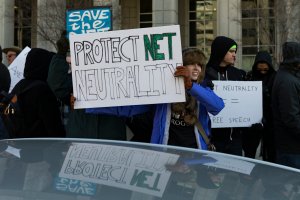With federal regulators poised to repeal net neutrality rules this week, your internet service provider would be allowed to speed up delivery of some online content to your home or phone.

Whether those fast lanes are coming, and what they ultimately deliver for Americans, is unclear.
The concept, known as paid prioritization, involves a telecommunications company charging an additional fee to transport a video stream or other content at a higher speed through its network.
The fee would most likely come from deals struck with websites such as Netflix willing to pay for a competitive advantage over an online rival. Or the fee could be charged to a company providing services that require reliably fast connections, such as self-driving vehicles or remote health monitoring of people with serious illnesses.
Read the full story on LATimes.com.















